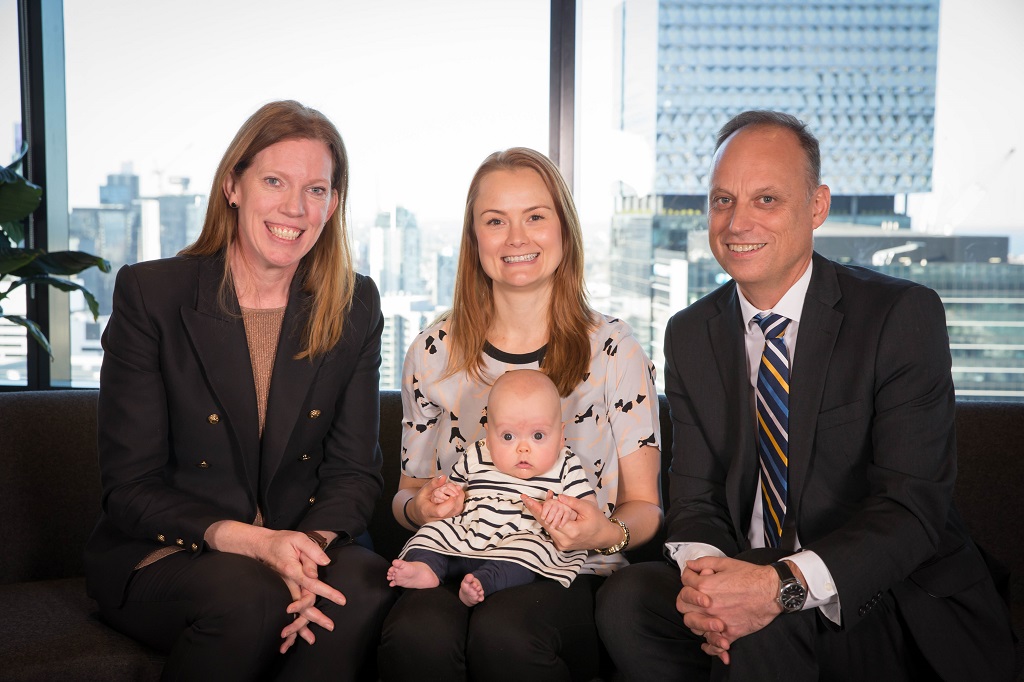At Viva Energy Australia, our new superannuation policy for working parents demonstrates our deep commitment to our employees.
A supportive work environment
Our Corporate Brand and Retail Fuels Marketing Manager, Stacey Mason, is currently on parental leave but usually heads up a team responsible for Shell’s retail premium fuels, corporate brand marketing, sponsorship of the Shell V-Power Racing Team and partnership with the Virgin Australia Supercars Championship.
Stacey has been with us for more than 10 years, where at times she made use of our flexible working approach. However, after falling pregnant with her first child, Meika, she gained a new appreciation of our parental leave policy.
Stacey was advised by her doctor that she had a “high-risk pregnancy” so she arranged to work from home one day a week once she hit the 30-week mark.
“Meika had other plans however and was born three months premature at 28 weeks, and I had to spend the two weeks before that in hospital on bed rest. Viva Energy was really supportive during this time,” says Stacey, who is now at home on parental leave with her happy and healthy baby girl.
“It’s really great to work for a company that is so flexible in what they offer both men and women in terms of coming back to work part-time after having children, flexible hours if you need to do a drop-off or pick-up, and the option to work from home if it fits with your role. It really made things easier during my pregnancy.”
The new superannuation policy
According to the Association of Superannuation Funds Australia, a women’s average superannuation balance at retirement is 52.8% lower than men’s1].
Because this retirement gap is partly due to the reduced earning capacity of new mothers in the first few years after childbirth, any of our employees taking parental leave (paid, unpaid or half-paid) will now receive the full employer superannuation contributions of 12 per cent of the relevant full-time equivalent base salary.
Then, for the first five years after the birth date of their child, part-time employees will continue to receive full superannuation contributions of 12 per cent.
The policy, applies to both men and women and we hope more men will start to take up parental leave and part time working options.
“I think this new superannuation scheme is amazing, and because Viva Energy is the first company to do it, it really does a lot to demonstrate how much they value their employees,” Stacey says.
“It’s saying: ‘We know there’s a gender pay gap and it’s not enough just to hire more women or make sure they’ve got the same opportunities. We’ve also got to do our best to ensure they’ve got the same money in the bank when they retire.’
“It will definitely be a financial help to me down the track, and it really makes me feel like they value and respect me as an employee.”
For now, Stacey is enjoying being home with Meika, but says she looks forward to returning to a company that is so willing to invest in gender equality.
“I always felt that Viva Energy was really good with flexible working and offering people part-time roles when they returned to work, but now to also help our financial status while we’re on leave and when we return to work is amazing,” she says.
“Why would I want to leave a company that is demonstrating how it values its employees – women in particular – and doing something so significant for them?”
In addition to the groundbreaking superannuation policy, we also offer new parents 14-weeks leave for the primary care giver, which is in addition to the Government paid leave scheme.
New parents can access this leave for up to two years after the birth of a child and can also access a new initiative called Grace Papers – an online parental program for male and female employees and their partners. Grace Papers supports new parents manage the challenges of a new baby and balancing working with caring responsibilities.
1] Clare, R. (2015), Superannuation account balances by age and gender (Sydney: Association of Superannuation Funds of Australia)




